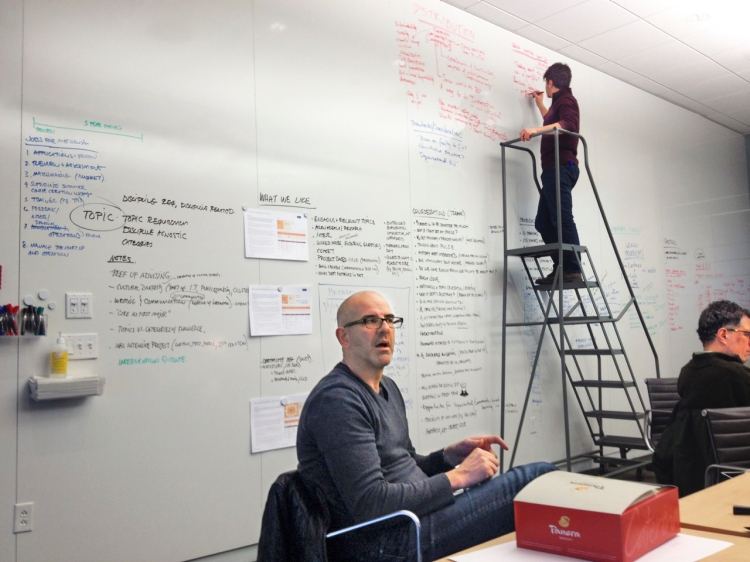
By
A broad-based effort to review and revitalize Boston College’s undergraduate core curriculum has made significant progress, having produced a draft of goals and objectives that will serve as a basis for upcoming core-related initiatives and programs.
The document — still undergoing revision — is the result of extensive discussions during the past few months by the Core Renewal Committee with groups of faculty, administrators, staff, students and other stakeholders in the University community. Formed last year, the committee is collaborating with Continuum, an acclaimed innovative thinking and design consultancy, on a renewal of BC’s undergraduate core curriculum, which was last revised in the early 1990s.
Core Renewal Committee co-chair Mary Crane, the Rattigan Professor of English and director of the Institute for the Liberal Arts, and committee member DeLuca Professor of Biology Thomas Chiles said the document describes several “experience pillars” that should be the core’s goals in contributing to BC students’ education. These include inspiring intellectual engagement, establishing enduring foundations and charting a purposeful journey, said Crane and Chiles.
“What we sought to do is identify major themes for the core that all the groups we spoke with could agree on,” said Crane.
The goals themselves may comprise several components, as Crane explains. “When we talk about ‘inspiring intellectual engagement,’ for example, that relates to encouraging more faculty involvement in the core, bringing their expertise and ideas into a classroom and looking at resources for faculty development.
“‘Enduring foundations’ commits the new core to the traditional liberal arts education, while promoting interdisciplinary pathways and linking to current and contemporary issues that are of concern to students. Similarly, the core should pay attention to the great writing and speaking traditions while also drawing on new media and technology, and preparing students to live and work in a multicultural world.”
Added Chiles, “The ongoing question is, how to make the core curriculum relevant to the world we live in, while retaining its ties to the classic liberal arts tradition that is a hallmark of Boston College? That is a challenge facing any effort to renew the core — what we’re trying to do is put in a place a framework to explore this question.”
The creation of goals and objectives is integral to the fourth of the planned five phases in the core renewal process designed by Continuum. In the first phase, called the alignment phase, Continuum met with the Core Renewal Committee and key administrative stakeholders to gain an understanding of the challenge of core renewal and the University’s goals and priorities.
In the second phase, discovery, Continuum did in-depth interviews with faculty, students and alumni to gain more insight into their needs and motivations, especially in connection to the core. In addition, the team did research on best practices at leading peer institutions and key trends in higher education, and held town hall-style meetings for faculty to discuss the project.
Last month, in the third or analysis phase, Continuum worked with the key stakeholders on an overall vision and general goals for the core. The resulting draft is undergoing revision in response to comments from faculty and administrators.
The current fourth phase, envisioning, will produce concrete plans for the structure and characteristics of the renewed core curriculum, and a mechanism that will provide for future innovation in the core.
This will lead to the final stage, deployment, which will prepare the renewed core curriculum experience for implementation beginning on a small scale with the 2013-2014 academic year and continuing over several years.
Crane and Chiles said the various discussions within the University community throughout the process have been thoughtful, revealing and positive overall.
“What we’ve heard is overwhelmingly strong support for having a core curriculum, that it is viewed as critical to the BC experience,” said Crane. “That so many diverse groups agree the idea of ‘the whole person’ is an important one for BC to uphold is very significant.”
“The common thread is, for all the different perspectives, people see the core as having value,” said Chiles. “The ideas and innovations that have come out of these talks are very reassuring, in that they show there are people on this campus who care about the core enough to want this renewal to be successful.”
Crane noted that student involvement has been a key feature of the process, including the presence of UGBC Academic Affairs co-chairs Siobhan Kelly ’15 and Nicholas Reposa ’14 on the advisory board for the Core Renewal Committee. She added that Continuum has attended UGBC meetings, sat in on core classes and held informal discussions with undergraduates in a further effort to cull student viewpoints.
Continuum’s performance in helping to lead and document the process drew praise from Crane and Chiles. “Continuum’s emphasis on thinking out of the box guarantees that the core will be innovative and improved,” said Crane, “and will make BC a distinctive university — perhaps even a model for others.”
College of Arts and Sciences Dean David Quigley, who co-chairs the Core Renewal Committee with Crane and Carroll School of Management Dean Andy Boynton, said, “The core renewal process is turning out to be a powerful reminder of the University community’s commitment to undergraduate education. I’ve been impressed by the range of thoughtful contributions and inspiring ideas that have come from colleagues across campus.”



